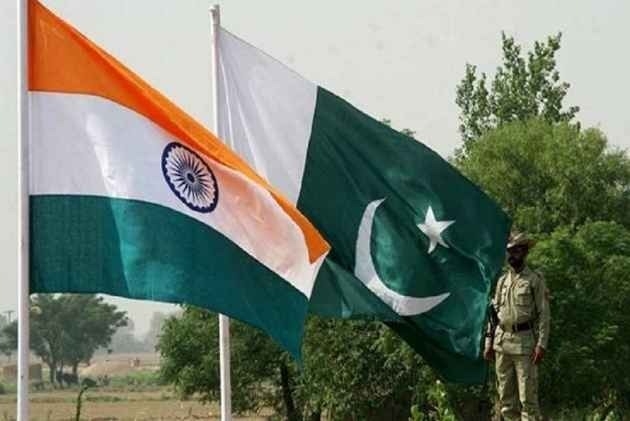

In order for Pakistan and India to avoid a nuclear war Pakistan must demonstrate its willingness to dismantle the terrorist infrastructure it has installed
<p>
<strong>The US National Intelligence Council has in its latest report stated that in the coming years, war between India and Pakistan is a highly likely scenario. The report published on April 9 suggests that despite all good intentions on both sides, a &lsquo;miscalculation&rsquo; might &lsquo;unwittingly&rsquo; lead to a full scale war.</strong></p>
<p>
Since the partition of the Indian sub-continent by the British in 1947,&nbsp;Pakistan has always displayed its obsession with geographical hegemony over neighbouring sovereign states and territories. On October 22, 1947 Pakistan attacked the sovereign state of Jammu Kashmir and to this day continues to occupy sovereign Indian territory. On November 1, 1947 Pakistan, with the help of British Mercenary Major William Alexander Brown, staged a coup against the then governor of Gilgit Agency, Brigadier Ghansara Singh and annexed Gilgit-Baltistan forcefully. And on March 28, 1948 Pakistan army moved into the Khanate of Kalat, an independent princely state, and incorporated Baluchistan into its republic.</p>
<p>
<iframe allow="accelerometer; autoplay; clipboard-write; encrypted-media; gyroscope; picture-in-picture" allowfullscreen="" frameborder="0" height="315" src="https://www.youtube.com/embed/_P08RD2FOMI" title="YouTube video player" width="560"></iframe></p>
<p>
India, on the other hand has never encroached on any of its neighbours&rsquo; territory. After the war of 1965 and 1971 India willingly returned Pakistani territories back to the aggressor. In future India has no desire to attack Pakistan. However, it is Pakistan that has trained an army of Islamic jihadists who have been indoctrinated with the sole aim of destroying India and massacring Hindus in a religious war commonly referred to as Ghazwa e Hind.</p>
<p>
The Pakistani establishment has only recently permitted a fascist religious organisation called Tehreek e Lebeek Pakistan (TLP) to start recruiting new religious warriors in Pakistani-occupied Kashmir (PoK). TLP has set up its head office in Mirpur city with sub offices in all major cities across PoK. They have even been given permission to contest the next legislative assembly elections in PoK.</p>
<p>
Since the DGMOs of both countries agreed upon a ceasefire on February 25, it is the Pakistan army chief General Qamar Javed Bajwa who has sanctioned the construction 700 plus bunkers across the LoC. The rhetoric regarding Kashmir has not died down in Pakistan.</p>
<p>
On March 31, Prime Minister Imran Khan and his cabinet rejected the decision made by the Pakistan Economic Co-ordination Committee to start trade with India without delay.&nbsp;The&nbsp;Pakistani&nbsp;government has pledged to its people that unless the Indian government reinstates&nbsp;Article 370, which was abrogated by the Modi government on August 5, 2019, there can be no trade between the two neighbouring countries.</p>
<p>
It is, therefore, Pakistan and not India who keeps rejecting every single opportunity to mend the broken bond of trust. Talk of extending a hand of peace and burying the past by General Qamar Javed Bajwa is and will remain nothing more than empty talk if the state he represents is not prepared to walk the talk. India does not want war. It is not in our economic, political or social interest to create an atmosphere of animosity in the region. And it is not India who is conspiring to break-up Pakistan. Pakistan, as a state, is disintegrating due to its own issues related with bad economic governance, political turmoil and usurped rights of its Baloch, Pashtun and Sindhi population.</p>
<p>
In order for Pakistan and India to avoid a nuclear war Pakistan must demonstrate its willingness to dismantle the terrorist infrastructure it has installed. Pakistan must let democracy flourish without the interference of the military establishment and guarantee social justice. If, and that is a big if, Pakistan disintegrates there are more chances of the region sinking deeper into Islamic jihadist chaos similar to that we witnessed in Libya and Iraq after the fall of Muamar Gaddhafi in Libya and Saddam Hussein in Iraq. This is not an outcome any sane mind would wish for. Therefore, it is in the best interest of the people of Pakistan that the state makes fundamental changes in their world outlook and bring an end to the culture of India and Hindu bashing.</p>
<p>
The US National Intelligence Council&rsquo;s calculations regarding the prospect of a future prolonged war between India and Pakistan is an assessment based on the current antagonist status-quo that continues.</p>
<p>
<em>(Dr Amjad Ayub Mirza is an author and a human rights activist from Mirpur in PoK. He currently lives in exile in the UK)</em></p>
Legendary actor and filmmaker Manoj Kumar, a stalwart of Indian cinema, passed away on April…
The Indian Army's Field Hospital continued with its medical support in Myanmar after the devastating…
Prime Minister Narendra Modi and his Thailand counterpart Paetongtarn Shinawatra held bilateral talks on Thursday…
Politicians and human rights organizations have called on the European Union (EU) to suspend Pakistan's…
Prime Minister Narendra Modi who is on a State visit to Thailand was gifted the…
Prime Minister Narendra Modi on Thursday held delegation-level talks with his Thai counterpart Paetongtarn Shinawatra…